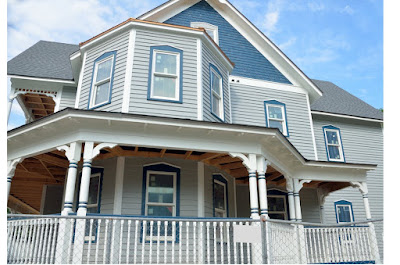What Home Improvements are Exempt from Tax?
Is the cost of home improvements deductible? Are home improvements tax-deductible? These are critical questions to ask yourself if this is the first time you've renovated your house in the last 12 months or if it's something you intend to do. Let's take a deeper dive.
Is Your Home Improvement Project a Tax Deductible Project?
Many types of home renovation projects are eligible for tax write-offs. But it really comes down to which type of remodel you're doing and whether the project is considered a repair, or an improvement.
Repairs vs. Home Improvements
An IRS definition of a repair is any change that restores a property to its original condition or value. Home repairs aren't tax-deductible unless you have rental properties or home offices. TaxSlayer shared some examples of home repair: replacing broken window panes, fixing leaky faucets, patching holes in carpet, replacing hardware and replacing a few damaged roof shingles.
An improvement refers to any modification that raises your home's worth. TaxSlayer says that improvements can include a new driveway or roof, new siding, insulation and attic insulation, as well as new septic systems and built-in appliances. Although improvements are usually tax-deductible they are not always deductible when the house is sold.
You can deduct home improvements made in 2013 and later sell your house in 2020. Even if there is no intention to sell your home in 2019, it is crucial to keep detailed records of any tax-deductible home improvement you made along the way to ensure you get the best possible return. Contact a local tax accountant if you have any questions about tax-deductible repairs or improvements.
3 Home Improvements Which Are Tax-Deductible
1. Energy-Efficient Renovations
Types Of Savings: Credit
It's the Same Year You Can Claim It
The 2020 tax return will allow homeowners to claim a credit equal to 10% of qualified energy-efficiency improvements as well as the amount spent or incurred in the taxable year.
Eat Now Drink Later Eat Now Drink Later Eat Now Drink Later Eat Now Drink Later Eat Now Drink Later Eat Now Drink Later Eat Now Drink Later Eat Now Drink Later Eat Now Drink Later Eat Now Drink Later Eat Now Drink Later Eat Now Drink Later Eat Now Drink Later Eat Now Drink Later Eat Now Drink Later Eat Now Drink Later Eat Now Drink Later Eat Now Drink Later Eat Now Drink Later Eat Now Drink Later Eat Now Drink Later Eat Now Drink Later Eat Now Drink Later Eat Now Drink Later Eat Now Drink Later Eat Now Drink Later Eat Now Drink Later Eat Now Drink Later Eat Now Drink Later Eat Now Drink Later Eat Now Drink Later Eat Now Drink Later Eat Now Drink Later Eat Now Drink Later Eat Now Drink Later Eat Now Drink Later Eat Now Drink Later Eat Now Drink Later Eat Now Drink Later Eat Now Drink Later Eat Now Drink Later Eat Now Drink Later Eat Now Drink Later Eat Now Drink Later Eat Now Drink Later Eat Now Drink Later Eat Now Drink Later Eat Now Drink Later Eat Now Drink Later Eat Now Drink Later
TaxSlayer reports that "Tax laws changes reduced what qualifies as for the Residential Renewable Energy Tax Credit" but left improvements for solar electricity intact. "The new tax law provides that credit for wind, geothermal and fuel cell improvement is only available until the end of tax year 2017. The solar credit is still available until 2019, after which it will be reduced every other year through 2021.
2. Home Improvements to Support Medical Care
Type of savings
It's the same year you can claim it
It can be hard to find tax deductions to pay for home improvements that are related to your medical care. However, if you plan to live in your home for the rest of your life, these deductions could be applicable in full. If your primary purpose is to provide healthcare for yourself, your spouse, or dependents, you can include medical equipment expenses in your home.
The following list of home improvements is fully-deductible as they do not increase value.
Healthcare Home Improvements with a Tax Deduction
Building exit ramps and entry ramps
Widening of hallways, and doors
Modifying/lowering kitchen cabinets
Transferring lifts from one level to another
Installing support bars within the bathroom
Modifying smoke detectors/fire alarms
3. Home Office Improvements
Type of savings
When you can Claim It: The Same Year
You must have regular, exclusive home use and your principal place of business to be eligible for a home office improvement tax deduction.
The most significant tax law reforms in recent years have occurred in the home office. Employees who use a separate workspace from their employer are no longer eligible to receive tax deductions. Home office remodels may still be eligible for self-employed people or entrepreneurs who run their own businesses.
Good news! You may qualify for this tax relief if both repairs and improvement are made in your home for business use. Improvements to your home and office are deductible over time along with depreciation. In addition, repairs can be claimed within the tax-year they were completed.
Home Improvements for Offices:
Repairs performed directly in your office
Improvements that are directly made to your office space
Repairs to other rooms of the home may be partially deductible
Some home improvements are partly deductible.

Comments
Post a Comment